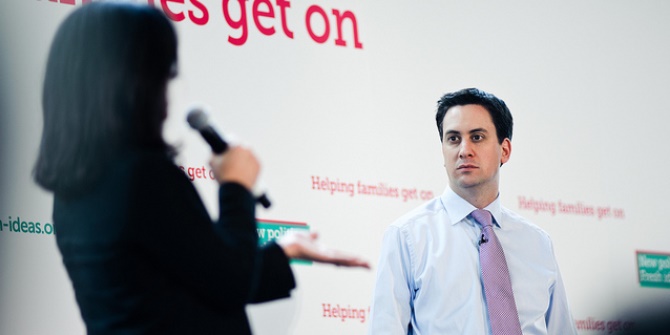 Ed Miliband essentially ruled out an in-out referendum on Europe earlier this week if Labour wins the election. John Gaffney argues that Miliband’s stance emboldens the persona he has cultivated as someone who stands up to the bad guys, from energy companies to the UK tabloids. For this, and for raising the debate on Europe to where it should be, he deserves kudos.
Ed Miliband essentially ruled out an in-out referendum on Europe earlier this week if Labour wins the election. John Gaffney argues that Miliband’s stance emboldens the persona he has cultivated as someone who stands up to the bad guys, from energy companies to the UK tabloids. For this, and for raising the debate on Europe to where it should be, he deserves kudos.
No one in British politics, no one, at least, to the left of Nigel Farage – from Cameron through to Ed Miliband and beyond – wants to talk about Europe. Nick Clegg has at last decided to do so after several years of silence. On Wednesday, 12 March, Ed Miliband entered the fray, twice, in fact; first in an opinion piece in the FT and then in a speech at London Business School, both designed to ‘reassure’ the business community of Labour’s pro-European business credentials, by saying, essentially, that a Labour government would not have an in-out referendum on Europe (unless there was the threat of the transfer of more power to Brussels). These interventions reach way beyond the business community (a lot of which was not reassured) and show us a picture of the party, its language and its leadership as regards the thorny issue of Europe. Ed Miliband doesn’t like talking about Europe; in fact, he likes it no more than David Cameron.
Both of them know that leaving Europe would be folly yet might be pushed towards doing so by parts of the political class and even more threateningly by a growing national disaffection fuelled by the Eurozone crisis and the UK’s tabloid press. Miliband doesn’t like talking about Europe because he and his team think it as an ordeal. I have just done some content analysis of his speeches since 2010, and ‘Europe’ bumps along the bottom. But he has to with the European elections fast approaching.
The structure of his FT piece and LBS speech are similar: an initial lauding of how Europe has ended world wars and extended democracy from the Atlantic to (almost) the Urals. This is followed by severe criticism of the EU today and then by what we – the UK – are going to do about it. The structure of Miliband’s arguments mirrors exactly all David Cameron’s speeches from 23 January 2013 onwards. In fact, Miliband’s speech could have been made by David Cameron, for it shows the same fear of the European question and uses similar false signals about immigration, for example, as if trying to appease the Daily Mail monster (where is the evidence that, say, the Polish immigration of the 2000s was anything other than beneficial to us overall, or, indeed, that EU migrants take our benefits?).

Over and above these issues which create a climate of apprehension that the left should dispel, is a much more politically dramatic consequence of being indistinguishable in tone on the European question from the Conservatives and intimidated by the Brussels-wants-to-straighten-our-bananas tabloids. When Nigel Farage talks about Europe, he doesn’t really tell us much about Europe but, rather, a great deal about Nigel Farage. All the major speeches by the party leaders now tell us a great deal about the character of the leader themselves as they move with their parties towards the elections.
Miliband has partly fashioned a public persona of a man who dares to stand up to the bad guys – to Murdoch, the big banks, the energy companies, the hawks on Syria. He could well do the same with the tabloids over Europe, for it is too important to shy away from, and it would embolden Miliband’s persona. Besides, as Nat Copsey shows in his new book (Rethinking the European Union, Palgrave, forthcoming), public attitudes in the UK to Europe are far more nuanced and reflective than the tabloids pretend. For Miliband to take a more positive lead in favour of Europe would raise the debate to where it should be, and would reflect well upon him precisely because it is a difficult issue.
The debate over Europe, the powers we already have to sort out its problems, the ways in which we should make the EU work for everyone, in particular its minorities, and the fact that leaving the EU is the road to ruin, are all aspects of an engaging discourse and rhetoric that would lend vigour to the Labour Party and new kudos to its leader.
Note: This article gives the views of the author, and not the position of the British Politics and Policy blog, nor of the London School of Economics. Please read our comments policy before posting.
About the Author
 John Gaffney – Aston University
John Gaffney – Aston University
John Gaffney is Professor of Politics at Aston University, and Co-director of the Aston Centre for Europe. He and Amarjit Lahel have recently published on Miliband and the Labour Party in both Government and Opposition and The Political Quarterly. His three most recent books are The Presidents of the French Fifth Republic (with David Bell, Basingstoke: Palgrave Macmillan, 2013), Political Leadership in France (Basingstoke: Palgrave Macmillan, 2012), and Celebrity and Stardom in Postwar France (with Diana Holmes, Oxford: Berghahn, 2011). He is currently a Visiting Professor at Sciences-Po, Rennes, and is running a Leverhulme project on political leadership in the UK.








1 Comments